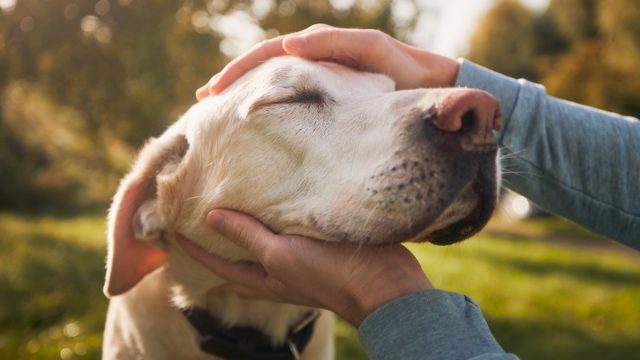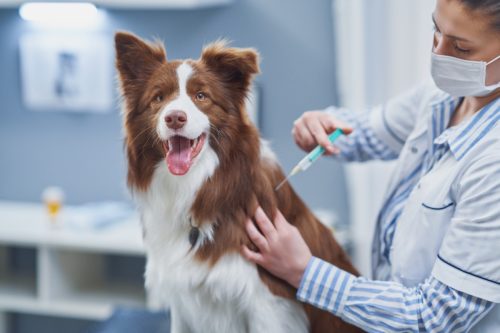5 Best Ways to Protect Your Dog From the Deadly New Mystery Illness Spreading

Dogs truly become a part of the family, and as an owner, you always want to do what’s best for them. That involves keeping their favorite food on hand and making sure they get enough exercise, and it also means keeping tabs on their health. Right now, you’ll want to take extra steps to protect your dog from illness, as a new, potentially fatal disease is spreading across the U.S.
The mysterious respiratory illness has been officially reported in at least five states—Colorado, Rhode Island, Oregon, New Hampshire, and Massachusetts—The Washington Post reported, but Today has noted that cases matching the disease description were also reported in Florida, Georgia, Idaho, Washington, Illinois, Indiana, and California.
Symptoms typically start with a cough and may be accompanied by coughing, sneezing, nasal or eye discharge, and lethargy, according to the Oregon Department of Agriculture (ODA), which has received over 200 case reports since mid-August.
The illness can progress to pneumonia and respiratory distress, WaPo reported, and making matters more complicated, it doesn’t seem to respond to antibiotics. In dogs who do develop pneumonia, it can become “rapidly severe” and lead to “poor outcomes in as little as 24 to 36 hours,” per the ODA. According to Today, there have been cases where dogs have died from the disease, but the exact number remains unclear.
Still, veterinarians are at a loss for what is actually causing the illness. Dogs have been tested for common respiratory diseases—because the symptoms are similar—but these tests aren’t coming back positive.
“We don’t know what’s causing it, and we can’t say definitively how it’s being transmitted,” Lindsey Ganzer, DVM, owner of the North Springs Veterinary Referral Center in Colorado, told WaPo. “We just don’t know enough right now.”
The ODA recommends “caution rather than worry” to keep your dog safe. So, while veterinarians investigate the disease, they’re also asking owners to do their part. Read on to find out the five ways they say you can protect your dog.
RELATED: Veterinarians Issue Urgent Warning to Dog Owners as “Severe, Fast-Moving” Illness Spreads.
1
Make sure your dog’s vaccinations are up to date.

In general, it’s a good idea to make sure your dog has all necessary vaccines. But right now, check with your vet to ensure your dog is up-to-date with those that provide protection from respiratory illnesses.
The ODA specifically recommends checking that your dog is covered for canine influenza, Bordetella, and parainfluenza.
RELATED: The Real Reason You Should Never Wake a Sleeping Dog, Vet Warns.
2
Avoid boarding your dog, if possible.

With the holidays here, you might have travel plans on the docket—and a reservation for your dog at the local pet boarding facility. However, if possible, vets say you should avoid boarding while this mystery illness is spreading.
“Where we’re seeing these cases come from in our hospital are from dogs that have been at boarding facilities or at doggie daycare,” Ganzer told Today. “With the holidays coming up, [and] people being more inclined to board their dogs as they go on vacation and as they go see family, I am worried about it getting much worse.”
As Mike Hutchinson, DVM, told CBS News Pittsburgh, even if your boarding facility requires proof of vaccinations as a precaution, it only takes one sick dog to put your pet at risk.
“Most of the day cares, at least around us, they require that all of the vaccines are up to date, that they have a health certificate from their veterinarian,” he said. “So most of the time you’re putting healthy dogs into that area but you get one dog that’s sick, it’s like the schoolyard cold, then the rest of them can get that cold.”
If you can, try getting a friend or a trusted pet sitter to watch your dog instead.
3
Monitor your dog for symptoms.

It’s important to keep tabs on your dog to see if they develop any symptoms, per Today—and if something feels off, head to the vet.
Don’t wait to see if it gets worse, either. According to Ganzer, early treatment is essential.
“We need to be treating sooner rather than later. It’s really important,” she told WaPo. “I’ve had cases where it’ll be two housemate dogs, and one of them will show signs, but I’ve gone ahead and started both on antibiotics. A couple days later, the other one will start to cough but is doing better than the first one.”
RELATED: 8 Dog Breeds With the Worst Health Problems, Vet Tech Warns.
4
Keep your dogs at home.

According to Today, vets also suggest keeping dogs at home when possible. This is especially important if your dog is sick or even looks sick with a cough, runny nose, or runny eyes, according to the ODA.
5
Avoid places where they interact with other dogs.

If your pet loves the dog park, you may be tempted to take them for some quality playtime. But vets suggest avoiding these settings for the time being, as it could increase their risk of contracting respiratory illness, Today reported.
“Just like with other respiratory pathogens, the more contacts your dog has, the greater the risk of encountering a dog that’s infectious,” the ODA press release reads.
In addition, it’s a good idea to skip their grooming appointment to minimize contact with other dogs, and the ODA suggests steering clear of communal water bowls, too.
RELATED: For more up-to-date information, sign up for our daily newsletter.